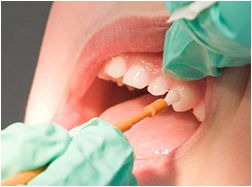Child Dentitry

Fluoride treatment is one of the best defenses against tooth decay! Dental Sealants and fluoride together can prevent almost all (95%) of all tooth decay!
Using fluoride toothpaste and drinking fluoridated water is usually the best source for your child receiving its benefits
.
Water is fluoridated in about two-thirds of cities and towns in the United States. If your water is not fluoridated or if your children’s teeth need morefluoride to maintain healthy teeth, our pediatric dentists can advise you on this; and prescribe it, if necessary, in the form of a gel, mouth rinse, or tablet. Children, between the ages of six months and 16 years, may require these fluoride supplements.
Children’s Dental Health Associates (CDHA) will consider many different factors before recommending a fluoride treatment. Your child’s age, risk of developing dental decay, and the different liquids your child drinks are important considerations. Bottled, filtered and well waters vary in their fluoride amount, so a water analysis may sometimes be necessary to ensure your child is receiving the proper amount.
Fluoride helps the smooth surfaces of the teeth the most. It is less effective on the chewing surfaces of the back teeth where dental sealants would be the best preventive measure.
How safe is Fluoride?
Fluoride is documented to be safe and highly effective. Research indicates water fluoridation, the most cost effective method, has decreased the decay rate by over 50 percent. Only small amounts of fluoride are necessary for the maximum benefit. Proper toothpaste amount must be supervised, and other forms of fluoride supplements must be carefully monitored in order to prevent a potential overdose and unsightly spots on the developing permanent teeth. Do not leave toothpaste tubes where young children can reach them. The flavors that help encourage them to brush may also encourage them to eat toothpaste.
Fluoride…
makes teeth more resistant to decay
repairs tiny areas of decay before they become big cavities
makes germs in the mouth less able to cause decay
- Why Are Primary Teeth Important?
- Primary teeth, also known as “baby teeth” or “deciduous teeth,” begin to develop beneath the gums during the second trimester of pregnancy. Teeth begin to emerge above the gums approximately six months to one year after birth. Typically, preschool children have a complete set of 20 baby teeth – including four molars on each arch.
- One of the most common misconceptions about primary teeth is that they are irrelevant to the child’s future oral health. However, their importance is emphasized by the American Dental Association (ADA), which urges parents to schedule a “baby checkup” with a pediatric dentist within six months of the first tooth emerges.
- What are the functions of primary teeth?
- Primary teeth can be painful to acquire. To soothe tender gums, biting on chewing rings, wet gauze pads, and clean fingers can be helpful. Though most three-year-old children have a complete set of primary teeth, eruption happens gradually – usually starting at the front of the mouth.
- The major functions of primary teeth are described below:
- Speech production and development – Learning to speak clearly is crucial for cognitive, social, and emotional development. The proper positioning of primary teeth facilitates correct syllable pronunciation and prevents the tongue from straying during speech formation.
- Eating and nutrition – Children with malformed or severely decayed primary teeth are more likely to experience dietary deficiencies, malnourishment, and to be underweight. Proper chewing motions are acquired over time and with extensive practice. Healthy primary teeth promote good chewing habits and facilitate nutritious eating.
- Self-confidence – Even very young children can be quick to point out ugly teeth and crooked smiles. Taking good care of primary teeth can make social interactions more pleasant, reduce the risk of bad breath, and promote confident smiles and positive social interactions.
- Straighter smiles – One of the major functions of primary teeth is to hold an appropriate amount of space for developing adult teeth. In addition, these spacers facilitate the proper alignment of adult teeth and also promote jaw development. Left untreated, missing primary teeth cause the remaining teeth to “shift” and fill spaces improperly. For this reason, pediatric dentists often recommend space-maintaining devices.
- Excellent oral health – Badly decayed primary teeth can promote the onset of childhood periodontal disease. As a result of this condition, oral bacteria invade and erode gums, ligaments, and eventually bone. If left untreated, primary teeth can drop out completely – causing health and spacing problems for emerging permanent teeth. To avoid periodontal disease, children should practice an adult-guided oral care routine each day, and infant gums should be rubbed gently with a clean, damp cloth after meals.
- If you have questions or concerns about primary teeth, please contact your pediatric dentist.










